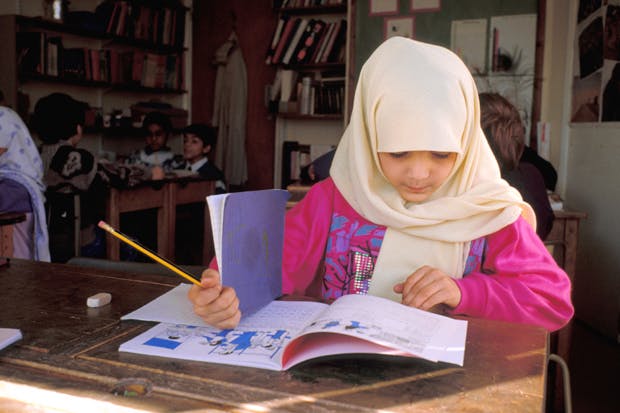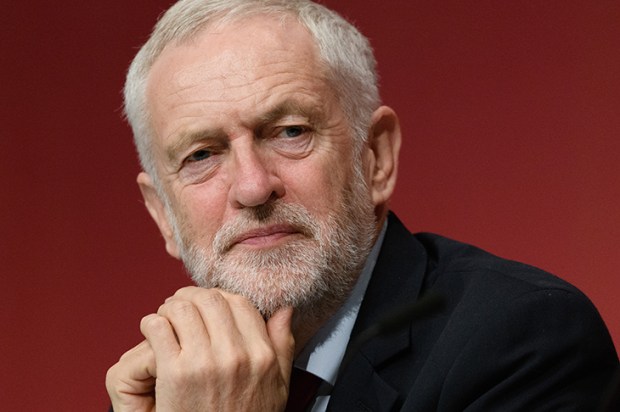Listen
http://traffic.libsyn.com/spectator/TheViewFrom22_12_June_2014_v4.mp3
I can remember where I was when Colin Powell presented to the United Nations his evidence for the existence of Saddam’s weapons of mass destruction. I was taking a friend to an emergency medical consultation at Victoria station in London and while she saw the doctor I settled down in the waiting room to watch the presentation on TV.
I found it compelling. Trusting the then US Secretary of State and believing him to be a good man — as Michael Gove is a good man — I felt confident Mr Powell himself believed what he was assuring us as the camera moved to blurred high-altitude pictures of little dots, and roads, and lorries, and some of the sites that were (it was alleged) key to Saddam’s plot.
So it’s with a sense of deja vu that I listen to the conflict between those who suspect a ‘Trojan horse’ Islamist plot to pervert the education of British Muslim children, and those who insist that however damning inspectors’ strictures about Muslim teaching in some Birmingham schools may be, they do not suggest any kind of conspiracy.
This ‘Trojan horse’ business is the new WMD; and I won’t let British neocons mislead me a second time. I admire Michael Gove tremendously as well as liking him personally, but I honestly think that something in his brain flips when Islamic extremism is mentioned.
I don’t warm to Islam, any kind of Islam. I distinguish utterly between a faith and its adherents and have the greatest respect for many Muslims; but I find that in our age their religion is a generally regressive force, according to my own European liberal ideas of human progress; and I don’t like regressive forces. The more extreme or ‘fundamentalist’ the version of this faith, the more regressive the effect appears to be; and for me the same applies with Christianity or Judaism. I don’t like any religion or sect that oppresses the human spirit, relegates whole categories of human beings — such as women — or crushes individual liberty.
It follows that I wish Muslims did not want their children to be encouraged in a culture that segregates girls, teaches that other faiths are blasphemies against God, believes homosexuality to be a sin, or wants women to cover their heads or faces. It follows too that where schools are being funded and supervised by the state, I would like a strict eye to be kept on possible departures from those values that we can agree should be at the core of a British state education.
Foremost among such values is what we might call ‘cultural relativism’ — the belief that up to a point individuals and communities are entitled to a measure of leeway for beliefs and practices that others may dislike or think wrong. As a political idea, cultural relativism teaches that rival claims to objective moral truth should not be adjudicated by the state, but suffered to live side by side. Neither Michael Gove nor Islam believes in cultural relativism. Michael takes a very Muslim position on the teaching of moral truth.
I don’t. That’s why, unlike Michael, I’m uncomfortable about taxpayer support for ‘faith’ schools, including some Christian and Jewish schools. Mosques and churches that want their adherents’ children encouraged towards a faith and its practices should pay for such schools themselves.
By his strong support for faith schools run by faiths of which he approves, Michael has got himself into a bit of a philosophical tangle. For the truth may be that all that has been happening in parts in Birmingham where British Muslims form the great majority, and where teachers and pupils are mostly from the same community, is that state schools have absorbed the cultural flavour of the locality they serve. Such a development, though natural, needs to be watched closely: I wrote above, and italicised, that we British rub along with different value-systems ‘up to a point’. But in Michael Gove’s mind I suspect this has got muddled up with fears that long pre-date his involvement with education: his fears about Islamism as a political and potentially terrorist force.
Believing that we can win this battle without taking emergency measures, I part company from the Education Secretary. I don’t think the law could in practice (even should we wish it to) define ‘religious extremism’ in language tight and objective enough to justify interfering with the liberties of citizens who have done nothing wrong beyond attesting to and recommending personal beliefs that Michael and I might think objectionable. It follows that, rather than ‘draining the swamp’ (Michael’s curiously ayatollah-like approach), you do have to wait for those who (to you) may resemble crocodiles, to show their teeth. Watch them. But wait.
And the evidence so far of any kind of plot is flimsy. It’s not enough to know that an attempt to hijack state schools is just the sort of thing certain people would love to do: we must also have evidence that they’re conspiring to do it. Stockpiling weapons of mass destruction was just the sort of thing Saddam Hussein would have loved to do. I regret that too many of us found that observation sufficient.
None of the reports and interviews we’ve heard so far from Birmingham strike me as demonstrating anything more than that some teachers with strong Muslim beliefs may have attested to those beliefs in the presence of schoolchildren, and indicated that it would please them to see such beliefs followed. Before non-Muslim readers recoil from even that possibility, they might try substituting ‘Christian’ for ‘Muslim’ in the preceding sentence, and see how it strikes them.
Michael Gove, were he to read this, would murmur that there’s more going on than I begin to know. But that’s what they said about WMD. I’ve come to prefer the view that, even with suspected crocodiles, we must wait for them to act, then prosecute the action. The jurisprudence in which this view is rooted is (if Michael will forgive me) British to its core. It should be taught in schools.
Got something to add? Join the discussion and comment below.
Get 10 issues for just $10
Subscribe to The Spectator Australia today for the next 10 magazine issues, plus full online access, for just $10.















Comments
Don't miss out
Join the conversation with other Spectator Australia readers. Subscribe to leave a comment.
SUBSCRIBEAlready a subscriber? Log in